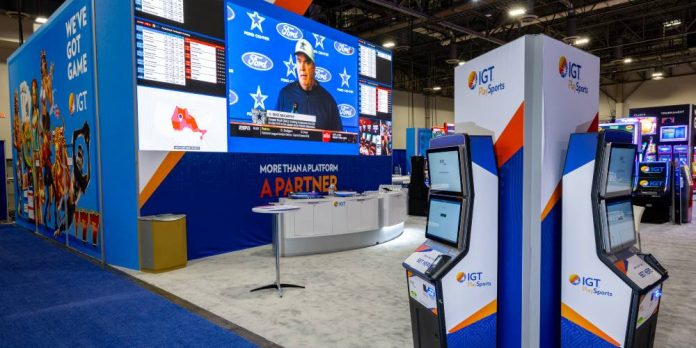With the vast majority of sports bets in the US now taking place on phones, many retail sportsbook operators are rethinking what a sportsbook needs to offer. Even if not on a phone, the devices people bet on are getting smaller too. Take, for example, the new IGT PlaySports Pads in use at Maryland Live! Casino, which puts a mini sportsbook at every seat in the book.
As the ticket counter becomes increasingly obsolete there are questions about the “best” way to create a retail sportsbook in the US. IGT’s President of Sports Betting Joe Asher would know better than just about anyone. Prior to his tenure with IGT, Asher served as the CEO of William Hill from 2012 through April of last year, guiding the company through its acquisition by Caesars Entertainment before moving on.
Retail betting goals differ based on what kind of operator is behind the book
Asher’s experience with both the retail betting establishments that have kept Vegas running for decades and the era of post-PASPA online betting gives him a keen perspective. It also helps him understand that “best” is not the way to approach how to create a retail betting experience. Instead, it is entirely about what your goals are as an operation.
“If you want to talk about retail, you have to break it into a couple of categories,” Asher explained. “So there’s the predominantly online operator and what role does retail play for them, like FanDuel? And then you have tribal casinos, for instance, who have the right over their compacts to have sports betting on-property or on the reservation like you see for instance, in Washington state or in Green Bay with the Oneida tribe. And I think retail is different from those places.”
Yes, both service customers who want to bet in person, but their goals differ beyond that.
“For an online operator, I think I think retail plays an important part in developing a brand, providing experience, and also trust for consumers as well,” Asher said.
Online operators can build trust with retail sportsbook presence
He used Bank of America as an example of how these brick-and-mortar locations help build consumer trust. As someone who banks with BOA, Asher almost never goes in a branch, but the fact he can go into a branch when things aren’t going right helps build trust in who handles his money. The same concept holds true for online sportsbooks.
“Subconsciously, you feel better.”
The other thing a retail sportsbook can offer is an experience. Whether it be the new Chickie’s & Pete’s sportsbook at Sahara or a sportsbook at Capital One Arena, which is also a Guy Fieri restaurant, operators are getting more creative in providing bettors with a memorable place to watch their favorite sports teams. Users remember these unique experiences and associate them with the brand, fostering loyalty.
The ability to create an experience that draws people in can certainly help tribal casinos now offering sports betting as well.
“It’s a reason to get people into the property, a reason to get new people into the property. One of the things I’ve heard repeatedly from customers is that ‘we got a bunch of people who’ve never seen before. They’re not in our database and they’re coming into the property because of sports,'” Asher recounted. “And then of course, once they’re there, then you have a chance to capture their information and name, and then you get a chance to turn it into customers to other parts of the property as well.”
Kiosks becoming an increasingly important part of retail betting offering
Sometimes, though, tribal properties cannot find the space or resources to build a giant sports bar and restaurant. When space is at a premium and managing the scope of labor matters, Asher said the tribes prefer to install kiosks rather than something like the PlaySports Pads. The Oneida Nation is also incorporating units into an existing sports bar space to provide gaming and betting opportunities while they watch the game.
One place Asher has an eye on regarding how kiosks are deployed is in Ohio. While he believes that major grocery chains like Kroger will be installing kiosks, he still thinks the communal experience of watching sports together wins out at the end of the day.
“In Ohio, I think it’ll be that sports bar-type experience with the ability to bet as well,” he said. In addition to Ohio being a sports-rich state, Asher sees these sports bars as pre-existing gathering places for those looking to watch the game. Putting a kiosk in a space like that packed with interested fans and would-be bettors provides them with the one thing they couldn’t do there before–bet.














